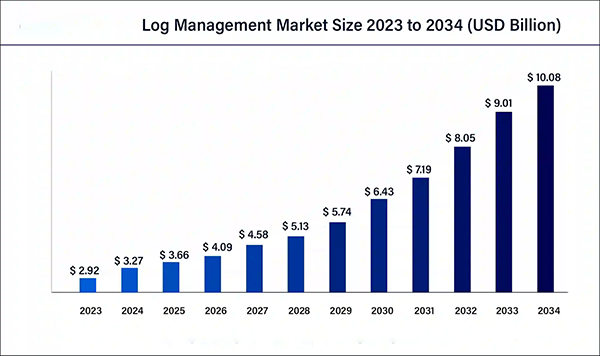“The cybersecurity industry will continue to grow as threats become more sophisticated, and companies need more powerful tools to detect and respond to those threats.”
— Kevin Mitnick, Former Hacker and Cybersecurity Expert
Data Breach, you might have noticed an increase in the use of these two words in recent years. This is because of the surge in cyberattacks that are increasingly becoming more sophisticated. It is concerning to note that 6.06 billion malware attacks were observed in 2023. (Statists: Annual number of malware attacks.)
I understand the value of data security and looking at these absurd statistics, I decided to integrate advanced log management tools to enhance security compliance in my business and the outcomes were astonishing.
I know some of you must be having several doubts about its role, working, benefits, challenges, and future implications. But no need to worry because in this article, I’ll share everything you need to know about it.
Understanding Log Management
All of you must be aware that businesses are required to handle vast amounts of data in order to function. The collection, storage, analysis, and monitoring of this log data is known as log management. This data can be gathered from various applications and systems within an organization’s IT infrastructure.
Now, some of you might be wondering, ‘What are logs?’ You can understand it as the records of events, transactions, or activities that occur on software or hardware systems.
Various organizations, including ours, use this as a source for maintaining security, ensuring compliance, and troubleshooting issues. This approach helps enhance our overall system performance.
TRIVIA
The very first logs were simple records of machine activities, often written on paper. As computers advanced, logs evolved into digital records. Today, we have advanced log management tools that can process petabytes of data in real-time!
The Role of Log Management in Security Compliance
Have you ever heard about industry regulations such as GDPR, HIPAA, SOX, and PCI-DSS? These regulations mandate businesses to store, monitor, and analyze logs. This helps them ensure data security, privacy, and accountability. Log Management plays a crucial role in facilitating these operations by providing a robust mechanism for the collection, storage, and analysis of data.
It contributes to security compliance by maintaining a detailed audit trail system for accountability, real-time monitoring, and keeping track and recording all the sensitive data.
If you are looking for an effective solution for this, you can consider log analysis. Their expert-infused technology provided my business with unmatched IT observability and security.
Benefits of Utilizing Advanced Log Management Tools
Log management brought numerous benefits to our business. I’ve enlisted four major perks that have a significant impact on our processes and help us ensure security compliance at all times.
- Early threat detection – We leveraged these tools to analyze logs in real-time, which helps us detect anomalies or suspicious activities at an early stage. These systems even flag irregularities automatically, acting as an additional army of soldiers to protect data.
- Real-time and Centralized Monitoring – SIEM solutions effectively monitor all logs and send alerts if any suspicious activity is observed.
- Efficient data retention– It includes features like automatic archiving and data retention, which helps us ensure that logs are securely stored and easily retrievable for audits and investigations.
- Ensuring regulatory compliance – Log management tools handle all the regulatory requirements, saving our business from costly fines and reputational damage.
Challenges in Implementing Log Management Solutions
No doubt, log management solutions provided us with immense help in various aspects of our business. However, there were some challenges that we faced while implementing these solutions, such as
- Data overload – The huge amount of data generated from various sources quickly became overwhelming for our system, resulting in slow processing and storage problems. We integrated log filtering, aggregation, and automatic archive systems to filter out and retain only the relevant logs.
- Complex Integration – These systems require to be integrated with multiple data sources, which makes the whole procedure complex and time-consuming.
- High cost – It includes various forms of costs such as software or subscription fees, hardware and storage expenses, staffing, and maintenance costs. This integration left a significant impact on our budget with so many additional expenses.
- Lack of knowledge and skilled personnel – Log management requires a certain level of skill for proper functioning. We had to spend on staff training for configuration, maintenance, and analysis.
The Future of Log Management and Compliance
As the intricacy of IT domains and the strictness of regulations continues to grow, log management systems prove to be an effective solution. Looking at the contemporary landscape, I can confidently say that in the future we will get to witness better and more robust mechanisms for the maintenance of logs.
You can expect more evolved cloud-based log management, with automation and AI in log analysis in the future, ultimately leading to enhanced security and regulatory compliance.
The expansion of the IT environment and increase in complexity results in the growth of the log management market size as they effectively manage security considerations to comply with stringent government regulations. The log management market is expected to rise from $3.27 billion in 2024 to $10.08 billion in 2034.


In the end, I hope this article helped you understand the impact and role of advanced log management tools on businesses. Yes, it brings several challenges with it, but the benefits provided in return are worthwhile. With the expansion of technology, these systems will only evolve and play a significant role in facilitating the complex operations involved in the maintenance of data and ensuring security.





